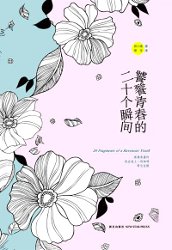Review of Guo Xiaolu’s 'Twenty Fragments of a Ravenous Youth' (郭小橹 饕餮青春的二十个瞬间)
 ](http://www.amazon.co.uk/gp/product/0099512939/ref=as_li_ss_tl?ie=UTF8&tag=easasistu-21&linkCode=as2&camp=1634&creative=19450&creativeASIN=0099512939" rel="external nofollow)_“I was seventeen. It was an unbearably hot summer’s morning. I opened the creaking shutter and looked at the mountains outside. A plain of sweet potatoes stretched out into the distance and the peaceful fields shimmered a little in the heat. I gazed at the grey clouds gathered in the sky. It was time to leave. The unfeeling sun was melting my young body. I told my seventeen year old self: Fen Fang, you have to live well.”_
](http://www.amazon.co.uk/gp/product/0099512939/ref=as_li_ss_tl?ie=UTF8&tag=easasistu-21&linkCode=as2&camp=1634&creative=19450&creativeASIN=0099512939" rel="external nofollow)_“I was seventeen. It was an unbearably hot summer’s morning. I opened the creaking shutter and looked at the mountains outside. A plain of sweet potatoes stretched out into the distance and the peaceful fields shimmered a little in the heat. I gazed at the grey clouds gathered in the sky. It was time to leave. The unfeeling sun was melting my young body. I told my seventeen year old self: Fen Fang, you have to live well.”_
So after two and a half years studying Chinese full-time, last week marked the proud moment I finished reading my first Chinese novel. It’s not like it wasn’t something I couldn’t have done sooner, but up to now I’ve struggled to find the motivation to keep on reading till the end. Last year I attempted a bilingual copy of ‘Lady Chatterley’s Lover’ but got distracted by the fact that the English had been retranslated from Chinese, rather than being the original text, which I imagine made the book much funnier (sorry D.H. Lawrence). Then in February I started reading a Taiwanese novel, 目送,one woman’s account of her mother’s senility and son’s alienation, but thought I’d wait till Jennifer Aniston made a film of it instead. I was starting to despair of finding a really good, readable novel by a Chinese author when I borrowed ‘Twenty Fragments’ from a fellow East Asia student.
Much of Guo Xiaolu’s work has been translated into English, and in the UK her most famous book is probably ‘A Concise Chinese-English Dictionary for Lovers,’ which I’d also strongly recommend. I’ve also read a collection of her short stories in English, ‘Lovers in the Age of Indifference,’ and enjoyed her darkly humorous take on topics as varied as Internet dating and baby-selling. So I had high hopes for ‘Twenty Fragments,’ and the book didn’t disappoint.
The novel is a series of disjointed chapters chronicling events in the life of Fen Fang, a young woman who leaves her parents and their sweet potato farm at the age of 17 to start a new life in Beijing. The story follows her attempts to get a job as a film extra, her money struggles, a run-in with the police and estrangement from her parents. But at the real centre of the story are Fen Fang’s failed relationships and her desire to be able to live independently of men.
“I want to see whether I can fully rely on myself to discover the glittering things of this life. I want to know whether I can sleep alone, and not long for the 37.2 degree heat of a man by my side.”
One of the main reasons why I loved reading this book is because Fen Fang represents a forgotten, alienated, individualistic youth who have nothing to believe in and just try to survive from day to day. At times the story is bleak and the narrow range of characters and locations becomes claustrophobic, but Fen Fang always manages to find – if not hope – then at least a reason to carry on. Secondly, the story evolves against the backdrop of rapidly-changing Beijing and its population of anonymous faces and chain restaurants. The contrast between dusty, cruel Beijing and Fen Fang’s sleepy rural hometown are stark, and one can almost feel the difference.
“I was angry. When I raised my head, the boy with long black hair had already gone. He took with him his Douglas, my Margaret. He had vanished into the huge crowd of young people and the relentless beeping of rushing taxis and bicycles of Haidian district.”
Fen Fang’s flaws make her a pitiful yet attractive character. We are taken entirely into her narrow life; we experience her lethargy, her inability to cut ties with a violent ex, her fear of being dragged back to her old life, and also her small dream of becoming a writer. Personally, at the end of the novel, I breathed a sigh of relief; it’s not a typically happy resolution but there is a much-needed escape from Beijing and her old life.
The language in this book is readable and interesting and I read the novel in about 2 weeks. With other Chinese books I’ve made the mistake of going through with a pencil and a dictionary and looking up the words I didn’t know, which is both time-consuming and can be de-motivational. This time I decided to carry on regardless, and found that I could guess most words through context or that the language was simple enough that I didn’t need a dictionary. However, the word 饕餮 in the title, which means more like ‘gluttonous’ than ‘ravenous’ is so rarely used in Chinese that none of my friends knew how to pronounce it (tao1 tie4, in case you were wondering) and I thus looked like a bit of a genius to them.
If you’re looking for an engaging novel in Chinese that offers something a bit different to what’s already on the mass market then I can’t recommend ‘Twenty Fragments’ strongly enough. I’m already planning which Guo Xiaolu novel to read next.
[20 Fragments of a Ravenous Youth - Amazon](http://www.amazon.co.uk/gp/product/0099512939/ref=as_li_ss_tl?ie=UTF8&tag=easasistu-21&linkCode=as2&camp=1634&creative=19450&creativeASIN=0099512939" rel="external nofollow “20 Fragments of a Ravenous Youth [Paperback]")
